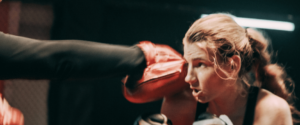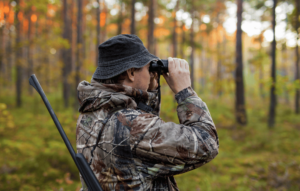Have you ever wondered why people are so fascinated by sports? The thrill of competition, the display of physical prowess, and the deep emotional connection to favorite teams seem to be somewhat universal experiences. But these surface-level attractions hide a deeper, more primal connection rooted in our evolutionary history. Long before the first ball was kicked or the first race was run, there was hunting – the original sport, where survival depended not just on strength and speed, but on strategy, precision, and teamwork.
Hunting wasn’t just a way of life; it was the ultimate test of human ability, honing the skills that would one day be celebrated in arenas and stadiums around the world. Today, while most of us no longer hunt for survival, the instincts and abilities that our ancestors developed during the hunt are still alive and well in the sports we play and watch.
In this blog, we’ll explore why hunting is not only the ultimate sport but also the foundation upon which all modern sports are built. We’ll look into the physical, mental, and social aspects of hunting, and discover how this ancient practice continues to shape our passion for competition and our admiration for athletic excellence.
Evolutionary Birthplace of All Sports
Hunting is where it all began. In the ancient world, survival hinged on the ability to hunt – tracking, chasing, and capturing prey were not just skills but essential elements of daily life. These activities demanded a combination of speed, strength, endurance, and strategy, traits that are now celebrated in every corner of the sporting world. The physical demands of hunting were immense, but it was the strategic thinking and teamwork that truly set the elite hunters apart. 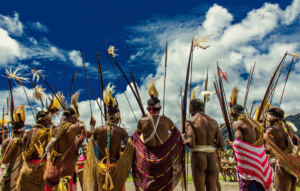
Tribal communities relied on the collective efforts of their members to bring down large game. The coordination and cooperation required in a successful hunt mirror the teamwork we see in modern sports. Just as a well-executed play in football or a coordinated attack in basketball can lead to victory, the success of a hunt often depends on the seamless integration of individual roles within the group. This is where the deep connection between hunting and modern sports shines clear – our admiration for athletic teamwork and strategy is a reflection of the cooperative skills that were once crucial for our survival.
Many of the motor skills that we developed through hunting – aim, precision, hand-eye coordination – are the very same skills that are so celebrated in sports today. Whether it’s the pinpoint accuracy of a basketball shot or the agility and speed of a soccer player, these abilities trace their origins back to the hunting grounds of our ancestors. This evolutionary perspective reveals that our fascination with sports is not just about entertainment; it’s a reflection of our deep-seated admiration for the skills that once meant the difference between life and death.
Ultimate Test of Strength and Endurance
Hunting is not for the faint of heart – even modern hunting. The pursuit of an animal requires a level of physical fitness that rivals, and in many cases surpasses, that demanded by modern sports (depending on your level of competition of course). The endurance needed to track prey over long distances, particularly when backcountry hunting, tests the limits of human stamina. Hunters have to be prepared to move swiftly and silently, sometimes for hours or even days, all while carrying equipment and, eventually (hopefully) the weight of their catch. This is where the comparison to endurance sports like marathon running also comes through as both require immense physical and mental fortitude to push through exhaustion and maintain focus.
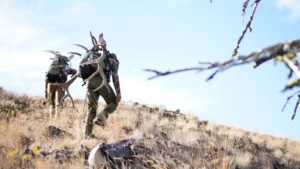
But it’s not just about endurance. Hunting also demands a high level of strength, particularly when it comes to handling weapons or managing the physical burden of game. For instance, drawing a bow with precision requires significant upper body strength, and the ability to carry or drag large animals tests the limits of human power. This is where hunting shows its versatility as a sport – one that challenges the body in a comprehensive way, from strength and stamina to coordination and balance.
Precision, of course, also plays a crucial role in hunting. The ability to aim accurately, to strike at the right moment, and to maintain control under pressure are all vital. These are the very skills that are prized in sports like archery, shooting, and even ball games where precision can make or break a performance. The physical demands of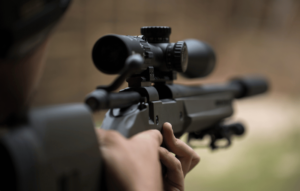 hunting, therefore, are not just about brute force; they encompass a wide range of athletic abilities that are celebrated in the world’s most popular sports.
hunting, therefore, are not just about brute force; they encompass a wide range of athletic abilities that are celebrated in the world’s most popular sports.
In hunting, every movement counts, and every decision has immediate consequences. This intensity, where the stakes are inherently higher than in most other sports, makes hunting a true test of physical capacity. It’s not just about outlasting an opponent or scoring the winning point – it’s about survival, which uniquely places hunting at a pinnacle of physical challenge.
Strategic and Psychological Edge of Hunting
Hunting is as much a mental game as it is a physical one. The success of a hunt often hinges on the hunter’s ability to remain focused, patient, and strategic under pressure. Unlike many modern sports, where the rules are fixed and the environment is relatively controlled, hunting presents a constantly shifting landscape of challenges that require quick thinking and adaptability. This mental discipline is what sets hunting apart as the ultimate sport – it tests not just the body but the mind in ways that few other activities can.
Focus is paramount in hunting. The ability to remain still and silent for extended periods, waiting for the right moment to strike, demands extraordinary concentration. This level of focus is akin to what athletes experience in sports like baseball or golf, where mental clarity is essential for precision. In hunting, however, the stakes are uniquely high – one wrong move can mean the difference between a successful hunt, going home empty-handed, or seriously injuring an animal that you can’t even retrieve.
Patience, too, is a key component of hunting. Unlike the fast-paced action of many sports, hunting often requires long periods of waiting, observing, and planning. This patience is not passive; it is an active state of readiness, where the hunter must be  prepared to react instantly when the opportunity arises. This mental endurance, the ability to wait without losing focus or becoming frustrated, is a skill that translates directly into sports that require strategic planning and timing, such as fishing or surfing.
prepared to react instantly when the opportunity arises. This mental endurance, the ability to wait without losing focus or becoming frustrated, is a skill that translates directly into sports that require strategic planning and timing, such as fishing or surfing.
Strategic thinking is where hunting truly shines as a mental challenge. Every hunt involves an incredibly complex set of decisions – where to position oneself, how to approach the prey, when to make a move, what the wind is doing, etc. These decisions also often need to be made in a split-second and with limited information, often in unpredictable conditions. This need for strategic thinking is mirrored in team sports like football or basketball, where players must constantly adapt their tactics based on the actions of their opponents and the flow of the game.
Incorporating insights from evolutionary psychology, it’s clear that the mental demands of hunting tap into our primal instincts, the same instincts that drive our fascination with sports today. The strategic and psychological challenges of hunting not only sharpen the mind but also connect us to a deeper, more ancient part of our nature. This is why hunting, as much as or maybe more than any other sport, remains a profound test of mental discipline, pushing the limits of focus, patience, and strategy in ways that continue to resonate with us on a fundamental level.
Social and Cultural Significance: Hunting as the Ultimate Team Sport
Hunting, at its core, is not just a solitary pursuit – it has always been a deeply social activity, requiring collaboration and teamwork for success – even for the solo hunter. In ancient times, successful hunts depended on the collective efforts of the group. Each member of a tribe played a crucial role, whether it was tracking the prey, coordinating the chase, making the final kill, or helping to process the animal. This teamwork is mirrored in modern sports, where the success of a team often hinges on the seamless integration of individual skills into a cohesive strategy. The saying that “no man is an island” rings true here. 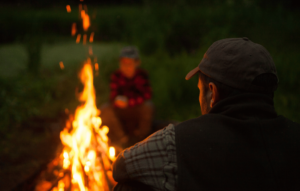
Cooperative hunting in the past required a level of communication and coordination that is strikingly similar to the dynamics of team sports today. Just as a football team must work together to execute a play, early humans had to rely on each other to corner and capture their prey. The ability to trust and support one another, to anticipate each other’s movements, and to adapt to rapidly changing situations were all essential for a successful hunt. These same qualities are what makes team sports so engaging and powerful – they reflect our deep-rooted need for cooperation and shared purpose.
Beyond the practical necessity of teamwork, hunting also played a significant role in social bonding and cultural transmission. The hunt was often a communal event, bringing together members of a tribe not only for the purpose of survival but also to reinforce social ties and cultural traditions through the sharing of a meal. This social aspect of hunting is echoed in the way sports bring people together today, whether it’s through playing, coaching, or cheering on a favorite team/athlete. The shared experience of sport, like the shared experience of a hunt, strengthens bonds and fosters a sense of belonging and identity.
Hunting also played a crucial role in establishing social hierarchies and status within a group. In many cultures, the most successful hunters were highly respected and often held positions of leadership. This connection between physical prowess, social status, and leadership is still evident in modern sports, where star athletes often enjoy a level of admiration and influence that extends far beyond the playing field. The ability to excel in hunting – or in sport – can elevate an individual’s status within a community, much as it did in ancient societies.
Closing Thoughts
Hunting stands as the ultimate and original sport, encompassing the physical challenges, mental discipline, and social coordination that define athletic excellence. It’s a pursuit that demands not only strength and endurance but also sharpens the mind through strategic thinking and patience. These qualities, essential for survival in our ancestral past, are the very traits we celebrate in modern sports today.
Beyond the physical and mental aspects, hunting has always been a deeply social activity, fostering cooperation, bonding, and a sense of identity within communities. The teamwork and camaraderie it requires – even for the solo hunter – mirror the dynamics of the most revered sports, reinforcing hunting’s role in shaping our cultural and social evolution.
As we continue to engage with and admire modern sports, it’s important to recognize the deep connection they share with hunting. This ancient practice remains a powerful expression of human skill and resilience, connecting us to our roots while continuing to influence our passions and pursuits in the present day.
